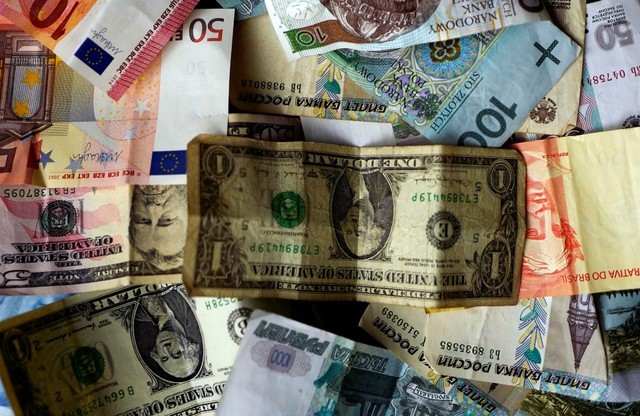Euro on course for weekly gain; U.S. tariffs hit Canadian dollar, peso

TOKYO (Reuters) - The euro seemed set to post its first weekly gain in seven weeks on Friday as worries over Italy's political crisis eased, but the Canadian dollar and Mexican peso were looking frail after Washington went ahead with stiff tariffs on imported steel.
The euro traded at $1.1692 (EUR=), little changed on the day but keeping intact its recovery from Tuesday's 10-month low of $1.1510.
So far this week it is up 0.4 percent after six straight falling weeks, hit by signs of slowdown in the euro zone economy and political instability in Italy and Spain.
But Italy's borrowing costs fell sharply for the last two days as the country's efforts to form a coalition government are back on track.
The two anti-establishment parties agreed on their pick for pivotal economy ministry after their initial, eurosceptic candidate had been rejected by the head of state.
"I had thought it could take a bit longer to come to any conclusion on the government. The markets seem to have over-reacted but that may have also helped them reach a deal", said Ayako Sera, market economist at Sumitomo Mitsui Trust Bank.
In Spain, a political vacuum looks set to be averted as Pedro Sanchez was almost certain to become Spain's new Prime Minister after his socialist party secured enough votes to topple Mariano Rajoy in a confidence vote scheduled on Friday over a corruption case.
On the economic front, the euro zone economy has been slowing down from strong growth last year but consumer price data published on Thursday showed inflation jumped to 1.9 percent, well above the forecast of 1.6 percent.
That could revive expectations of an eventual rate hike by the European Central Bank if market worries about politics in Southern Europe subside further.
The common currency hit a half-month high against the British pound, fetching 88.02 pence (EURGBP=D4).
While concerns about European politics ease, fears of a trade war between major economies are back on investors' minds after the United States moved ahead with tariffs on aluminum and steel imports from Canada, Mexico and the European Union, ending the two-month exemption it had given earlier.
Canada and Mexico retaliated against the United State's decision while the European Union had its own reprisals ready to go.
The Canadian dollar stood at C$1.2950 to the U.S. dollar , after falling 0.65 percent the previous day.
The Mexican peso hit a 15-month low of 20.050 to the dollar on Thursday and last stood at 19.908 per dollar.
The dollar ticked up 0.2 percent to 109.02 yen , helped by rise in U.S. bond yields following easing worries on Italian politics.
The 10-year U.S. Treasury yield rose almost 5 basis points in Asia to 2.871 percent (US10YT=RR), rising further from this week's low of 2.759 percent.
The yen fell on Friday even as the Bank of Japan reduced the amount of its Japanese government bond buying for the first time since late February .
"The dollar could be firm in the near-term on easing concerns over Italy. But given that some emerging markets have been fragile, I think the overall trend is still risk-off and the dollar/yen is likely to head lower," said Osamu Takashima, chief Tokyo-based currency strategist at Citigroup (NYSE:C) Securities.
U.S. job data due at 1230 GMT is the next key focus as investors assess the course of the Federal Reserve's monetary policy.
Start Trading with Free $30 : CLAIM NOW $30
VERIFY YOUR ACCOUNT AND GET YOUR $30 INSTANTLY ,MAKE MONEY WITHDRAW !!
IF YOU FACE ANY PROBLEM TO GET THIS OFFER PLEASE CONTACT US FOR
SUPPORT , CLICK SMS BAR ABOVE THEN TALK TO US.


Comments
Post a Comment